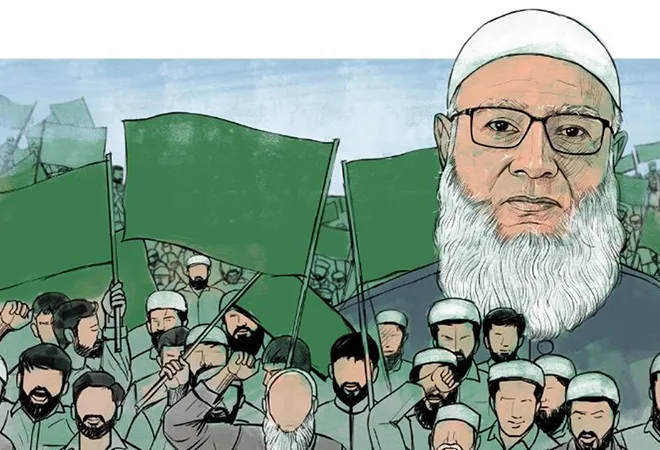
The Bangladesh Jamaat e-Islami (BJI), an Indian origin group that branched off into Bangladesh due to political events, was largely quiet over the last decade owing to the ban placed on it by the ruling Awami League led by the current Prime Minister Sheikh Hasina. Yet, recently, the group came back to the fore of Bangladeshi politics when it led a
huge rally in Dhaka in June 2023. Several factors explain the resurgence of this group in the capital after a strict curb in its activities.
History of BJI
The Jamaat e-Islami (JeI) is an Islamic revival movement started by the Hyderabadi born thinker, Abul A’ala Maududi (d.1979) in 1941. Maududi, a charismatic speaker and writer was initially
aligned with the Indian National Congress in the anti-colonial struggle but left the party due to the prominence of members of the Hindu Mahasabha faction within the party. Over time, he developed an Islamic group with the main objective of restoring Islamic rule. Maududi is credited with popularising the concept of
Hakimiya, i.e. sovereignty belongs to God and not human beings, thereby, necessitating an Islamic governance. Due to this, he was against the idea of secularism and democracy, terming them “western” concepts that enabled different sorts of Islamically-forbidden activities (such as alcohol, prostitution etc.).
Maududi was initially opposed to the idea of Pakistan due to it being based on Muslim nationalism rather than Islamic principles but later shifted to Pakistan after Partition to play a role in Islamising the society there. While the Jamaat e-Islami in India
recalibrated its position to engage more closely in democracy and to support Indian secularism, the Pakistani Jamaat (including then East Pakistan – Bangladesh) was largely in favour of setting up an Islamic state over time.
The Bangladeshi Jamaat e-Islami and Maududi was thus
opposed to the idea of Bangladeshi nationalism (again due it being premised on non-Islamic principles and it separating the Muslim state of Pakistan). Consequently, in 1971, during the Bangladeshi War of Liberation, the JeI in the nation
colluded with the Pakistani army to the detriment of Bangladesh. After Bangladesh gained independence, they engaged with the political system to work towards setting up an Islamic government and
contested elections. Although they were not initially successful, they worked with both the Awami League (1986 and 1995 -1996) as well as the Bangladeshi Nationalist Party (BNP), the main opposition party in the nation.
Maududi was initially opposed to the idea of Pakistan due to it being based on Muslim nationalism rather than Islamic principles but later shifted to Pakistan after Partition to play a role in Islamising the society there.
Most recently in the 2008 elections, the Awami League ran its campaigns on the promise of placing all JeI leaders who were accused of colluding with the Pakistani army in 1971 on
war trials. After winning the elections, Sheikh Hasina made good on her promise and helped
facilitate the imprisonment and death sentences of many JeI members from the 1970s. By 2013, the group was also
banned from taking part in any further political party with much of the public supporting these moves with various protests taken out in their favour. Yet, the reversal a full decade later raised many eyebrows both in Bangladesh and across the world.
Contextualising Bangladesh
Given that running a political rally in Dhaka requires police and government permissions, it is quite clear that the government was responsible for this reversal. Explaining the several factors that could have led to this decision requires a brief contextualisation of the current political climate in the nation.
Bangladesh, which was once
touted as one of the fastest growing economies in South Asia with among the best Human Development Index scores for various achievements for its women and labour population, has seen a deterioration in that regard. Sheikh Hasina, who was initially applauded for her role in curbing the Jamaat e-Islami, used the same justifications of Islamism and extremism to clamp down on her political opponents, the
Bangladesh Nationalist Party (BNP).
Bangladesh, which was once touted as one of the fastest growing economies in South Asia with among the best Human Development Index scores for various achievements for its women and labour population, has seen a deterioration in that regard.
Over time, the financial gains made in Bangladesh were soon wiped out by two major events, the
Covid-19 crisis as well as the
Russia-Ukraine conflict, both of which led to loss of jobs and livelihoods as well as rises in fuel prices, consequently leading to increase in food and other essential item prices.
Explaining the factors
Against this backdrop, the United States (US), ostensibly concerned by Sheikh Hasina’s increasingly authoritarian stature, recently stated that it would clamp down on any Bangladeshi politician (past or present) that undermined democracy in the nation. According to Bangladeshi politician
Gayeshwar Roy, this was among the main reasons for the government to allow for the BJI to participate in the elections fearing restrictions on travelling to the US later on. Here, it is important to note that the BJI was not the only beneficiary of the move, and that the opposition BNP also conducted its first
unfettered rally after 14 years in May without any interference from the government.
It is notable that previous US government reports have chastised the Awami League government for banning the BJI as a political party.
In addition, several news reports have noted that both the opposition party, the BNP, and the BJI have hired
lobby groups in Washington to lobby the US government to pressurise the Bangladeshi government on issues of human rights (and previously on the war crimes issue). It is notable that previous US government reports have
chastised the Awami League government for banning the BJI as a political party.
Thirdly, it is also important to note that the BJI, despite being banned as a political party and being monitored by the Bangladeshi government, was also quite active in other forms. For instance, the
Bangladesh Islami Chhatra Shibir, the student wing of the BJI has been active to some extent in universities despite several arrests. Moreover, some have noted that the BJI leaders also held several meetings at different points.
Conclusion
It is important to note that the return of the Jamaat-e-Islami in Bangladesh plays an important role in the political scenario and the upcoming elections of 2024. However, by no means will this group be the focus of the coming elections. The BJI, despite having some following, has never won a majority of seats in previous elections. It has, however, played the role of a
kingmaker whereby it has helped either the BNP or the AL breakthrough electoral deadlocks previously.
The BJI, thus, forms one (small) part of the equation with the domestic and international observers looking at the BNP’s performance as well in the upcoming elections. It is too early to comment on how much the BJI will then influence the voting strategy and power dynamics of the nation but a persistent effort from the group will see it gaining some growth in the upcoming months.
Mohammed Sinan Siyech is a Non-Resident Associate Fellow with the Strategic Studies Programme at the Observer Research Foundation
The views expressed above belong to the author(s). ORF research and analyses now available on Telegram! Click here to access our curated content — blogs, longforms and interviews.



 The Bangladesh Jamaat e-Islami (BJI), an Indian origin group that branched off into Bangladesh due to political events, was largely quiet over the last decade owing to the ban placed on it by the ruling Awami League led by the current Prime Minister Sheikh Hasina. Yet, recently, the group came back to the fore of Bangladeshi politics when it led a
The Bangladesh Jamaat e-Islami (BJI), an Indian origin group that branched off into Bangladesh due to political events, was largely quiet over the last decade owing to the ban placed on it by the ruling Awami League led by the current Prime Minister Sheikh Hasina. Yet, recently, the group came back to the fore of Bangladeshi politics when it led a  PREV
PREV


